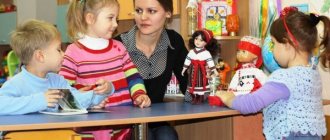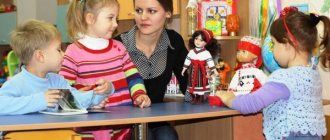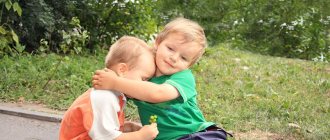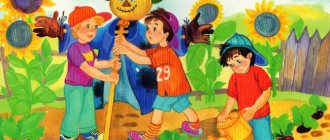When to start developing the moral qualities of a person
There is an opinion that a person’s character is formed before the age of 5 - the rest of the time it can only be adjusted. Yes, the foundation of personality is laid in early childhood, but under the influence of the immediate environment, a person’s moral qualities can undergo changes throughout his life. Another statement: how well a child is raised depends on his future fate, the opportunity to find his place in life, and the ability to become happy.
By the age of 5, a child, as a rule, is already able to evaluate his actions, separate good behavior from bad, and control his emotions.
A child will not be able to develop the necessary moral qualities and behavioral skills without the direct participation of significant adults in this process. That is, the child must be taught all this, just like counting or tying shoelaces. The closest people to preschool children, as a rule, are parents and teachers.
Spiritual and moral education of preschool children - Teplova A.B. / Educators of Russia
Stages of child moral development
Parents, educators and peers play a critical role in the development of spiritual and moral qualities, which at their core are a set of rules and expectations that determine behavior. At different stages of their development, children have different values, different points of view, and many connections that influence their moral development.
- Stage of punishment and submission. In the early stages of moral development, children are driven by the desire to avoid punishment and satisfy their needs through obedience to rules and simple choices between right and wrong.
- Stage of justice and equality. At this stage of development, children become selfish; they strive to satisfy their needs before others. Very rarely do children meet the needs of others.
- Stage of expectations and rules. With experience and help from adults, children progress to the next stage of moral development, where individual morality is shaped by interpersonal norms and the expectations of others (such as peers, teachers, and parents).
- Law and order stage. At this stage of development, behavior is characterized by obedience to the law, respect for persons in authority, and adherence to social rules and norms.
- Social contract stage. Outside of traditional ideas, appropriate behavior is based on social norms, rules and laws. However, care must be taken to ensure that individual values are not violated and that fairness is maintained.
- Stage of universal and ethical principles. Although behavior is often governed by rules, laws, and expectations, there are exceptional circumstances where independent judgment and moral reasoning may trump conventional norms in the decision-making process.
Tasks of moral education of preschool children
The spiritual and moral education of preschool children is based on several important “pillars”:
- a life principle built on goodness, the absence of sinfulness and evil;
- humane attitude towards friends and strangers;
- development of cultural skills;
- growth and harmonious development of the child as an individual.
Each of the principles involves specific work with the baby. So, in the first case, good fairy tales or Orthodox parables that children can understand, in which good certainly triumphs over evil, will help convey the necessary information.
Unobtrusive conversations, stories and examples from life will teach you to treat others humanely.
You can cultivate a craving for cultural values by first visiting nature museums with your child, and then galleries and exhibitions. If you don’t have the necessary knowledge yourself, you can take a guide who, taking into account your age, will tell you about the exhibits in an interesting and fascinating way.
Moral education of children using Russian folk tales and Soviet animation
MAGAZINE Preschooler.RF
“Formation of spiritual and moral values in preschool children”Author:
Migaleva Marina Vladimirovna, teacher of the preschool educational institution, combined kindergarten No. 1 Russia, Belgorod region, Alekseevka
Forming a child’s personality, instilling in him a correct attitude towards the environment and a certain moral position is a complex pedagogical process. To educate means to introduce certain spiritual qualities into a person, just as to nourish; to nourish means to introduce into the body its nutritional salts, physical and material substances. The basis of education is the correct, harmonious development of feelings.
Moral education is based primarily on universal human values that have developed among people over many hundreds of years of the existence of human society and are uniform and common to all people.
Universal human values are a reality. All people in a holistic, interconnected world. Everyone has a single, universal principle, one Earth and habitat; everyone equally needs clean air, water, soil, warmth and sunlight. In this sense, the human race has a sacred right to life, the right to exist, to develop and to self-determination. Many people forget that we all live in a world that is constantly changing. But with all this, we must not forget that there are “things” in the world that, in spite of everything, remain unchanged and are common to all people living on earth. At all times, people valued honesty, justice, mercy, love for mother, Motherland, camaraderie, kindness, integrity, and lies, hypocrisy, betrayal, callousness were considered qualities unworthy of “real people.”
What to base the upbringing of children on? Of course, on moral values.” Introducing a child to the values of universal human culture, developed over centuries, which have survived more than one generation of people and which carry within themselves the moral foundations that every person should be guided by in their life, is one of the most important conditions for the development of a child’s personality. What are the most important qualities we want to see in our children? Of course: politeness, delicacy, modesty, sociability,
discipline, sensitivity, tact, courtesy. These qualities are built on moral principles, therefore moral principles (kindness, honesty, mercy, etc.) should become the support of the teacher.
In the process of education, a strong philosophical and ethical foundation is necessary.
It will become possible to solve this problem only when the priority in education is given to the idea of developing a personality that is spiritually rich and morally fulfilled.
There are no ideal ready-made recipes in education; there may be general basic provisions that determine the degree of communication between the teacher and children,
guidelines in work, there should be possibilities for various options for organizing children.
When building his relationships with children, interacting with them, the teacher needs to know the psychological characteristics of his pupils, some mechanisms of psychological processes. “We must first of all understand the movements of a child’s heart,” St. John Chrysostom said more than once. [1, p. 52]
He who, in the name of his desires, casts aside the laws of conscience will never become a man and a citizen. And Christian education teaches that one of the most difficult tasks in preschool education is the disclosure of conscience. A person without conscience is a plague on society.
Psychologists and teachers emphasize that children’s feelings develop most intensively in preschool childhood. They can manifest themselves both in the child’s attitude towards himself (self-esteem, superiority: or, conversely, a feeling of inferiority, confidence or despair, etc.), and in relation to other people (sympathy or antipathy, sympathy, malice, anger, indifference , feelings of friendship, love, camaraderie, feelings of shame, guilt, etc.), to the team (solidarity), to art (aesthetic feelings). “A child of senior preschool age already develops the beginnings of complex feelings (justice, love for the Motherland, affection for children of other nationalities. Later this turns into more complex feelings.” [3, p. 342]
For the formation of a child’s feelings and his normal development, cultivating an emotionally positive attitude towards the environment is of great importance. The child is emotionally responsive to what is happening around him; through emotions and feelings, the preschooler forms many ideas about various phenomena of the world around him. Not only the formation of his ideas, but also the desire to act in the current situation in accordance with these ideas depends on what emotions the child develops and what feelings he experiences. Positive emotional states are the basis for a friendly attitude towards people and a willingness to communicate. Negative emotional states can “cause bitterness, envy, fear, alienation, because raising children is a risky business. An act that was born from a moral feeling and impulse first experienced enters into the child’s moral experience and will create the basis for the repeated manifestation of such feelings in similar circumstances, i.e. The motives for the child’s moral behavior must be taken into account.”
At preschool age, moral feelings begin to form, which are important for the development of children's relationships. Children already in their third year of life may exhibit such personality traits as sociability or shyness, independence or lack of self-confidence, selfishness or goodwill, and attentive attitude towards friends. The development of feelings in a child largely depends on the means and methods of education, on the conditions in which he participates. With purposeful education
a child’s feelings are much richer, more varied and appear earlier than in children who have not received the right upbringing. And as A.S. said Pushkin: “Lack of education is the root of all evil.”
“A child gains initial ideas about relationships between people by observing the relationships of the adults around him. Their behavior, as well as their attitude towards him and his actions, becomes like a behavior program for the kids. Based on the model given by adults, he builds his relationships with people.” .
It is important that in preschool childhood the child experiences maximum positive emotions. [4, p. 120]
The task of instilling moral feelings in children is solved the more successfully the more humane the adults themselves are, the kinder and fairer they treat children. “All teachers of our time agree that in the matter of education the most important thing is to acquire the trust and love of a child, and that love is won primarily by love.”
Of course, a gentle, kind attitude towards a child does not at all mean a lack of demands. Only a reasonable combination of love and exactingness gives the desired results; children increase their desire to behave better, achieve success in all matters, and gain confidence in their strengths and capabilities. But it should be noted that demandingness as such can only be possible with children in older preschool age. And the younger the child, the more direct his moral education should be, the more he should not be taught, but accustom him to good feelings, inclinations and manners, basing everything primarily on habit.
One of the most important conditions for the successful development of a child’s moral feelings is the creation by adults of a cheerful environment around him. You should never extinguish children's joy. In an atmosphere of joy, such valuable spiritual qualities as goodwill, willingness to help, etc. easily arise. In a state of joy, it seems to the child that everything is available to him, he willingly takes on the work he has started, he develops a feeling of confidence in himself and his strengths, he becomes more active, and readily carries out work assignments, helping adults. It is important that adults correctly assess the child’s state of mind and share his joy.
Raising a small child begins with instilling in him useful habits that organize his behavior and communication with adults and peers.
The moral concepts that lie behind external forms of behavior are not immediately comprehended by him, and therefore represent the greatest difficulty for the teacher and parents in forming the moral foundations of behavior in the child.
The problem of the spiritual development of the individual, the growth of his moral level remains relevant for modern teachers. Events taking place around us indicate the need to solve the problem of spiritual and
moral development of society. All this makes the problem of forming moral ideas in preschoolers relevant and significant in a modern children's institution.
Educators need to teach the child to make the right moral choices.
Of course, speaking about children, it is too early to talk about the formation in them of such qualities as honesty, courage, kindness, etc. However, what is created by communication is no less important. This is a feeling of emotional well-being, warmth and comfort in a new and unfamiliar world. Society offers the child certain norms and requirements. It’s just a matter of “small things”: making them comply. And for now there are only two ways to achieve this: either arrange it so that the child himself wants to fulfill this or that norm of behavior, or force him. The first is preferable, but more difficult. After all, the desire to be kind and fair is not yet realized by a child. But it is worth clarifying that young children are not capable of real moral behavior, but for the sole reason that they lack highly developed or abstract reasoning skills. young children, without any training, take care of others.
And if adults make mistakes in upbringing, then the child may lose all his positive qualities. Or at best, for certain reasons, simply not use them. And then adults begin to use the second way in education, forcibly forcing the child to adhere to moral qualities, which, naturally, at best, leads to nothing.
But still, let's focus on the first path, where the main task of adults is to direct excessive children's activity and energy in the direction we need, i.e. teach to live according to moral principles. But this is precisely the main difficulty.
How to educate the basics of moral feelings in preschoolers? How to instill in them the desire to perform moral actions of their own free will, and not because of any benefit, or out of fear of us, adults.
Many representatives of various pedagogical concepts try and put a lot of effort into instilling in children from an early age a passionate desire for beauty, turning them away from the ugliness of chaos, which opposes harmony and order, and raising children in accordance with their natural abilities.
The main thing is obvious - if parents fix their attention on all aspects of harmony, then their children will most fully perceive the ideal of beauty.
Mothers and fathers should use the main method of developing morality - having conversations in the family. The conversations themselves should be well planned, and a new topic of discussion should be chosen each time. It is best to tell: a story about animals, fables, fairy tales, etc., giving examples from life - all this gives information about the world, about norms of behavior, and develops the characteristics of children’s thinking and feelings.
The child will develop empathy, responsiveness, and the ability to put himself in the place of another person in order to understand: what is unpleasant for us is unpleasant for him. Teachers constantly have to remind parents of all this.
To do this, it is necessary to conduct conversations, consultations, joint leisure activities and competitions between parents and children, display the necessary information on stands, and much, much more...
We must always be sensitive, not interfere in the lives of other people, not hurt their honor. We must love people, treat their dignity as carefully as our own, because... only then can we be worthy representatives of the human race. These qualities are called human perfectibility and moral virtues. Anyone who does not possess such traits will never fulfill his destiny as a human being and may even become worse than an animal, for an animal will never commit such acts as an immoral person does.
We see that morality largely depends on the cultivation of a healthy conscience. Admittedly, raising children and teaching them good manners from childhood requires patience and strength. If this task were easy, then we would not see such a difference between cultured and uncultured people. If human behavior improved over time, with the acquisition of experience, then there would be no need to spend so much effort on it, and people would grow like trees in a forest. Biologically, a person, of course, develops on his own, but this is not enough. The development of moral and spiritual abilities depends entirely on education.
Bibliography:
- Bogdanova A. “Black vestments will not save us, white vestments will not destroy us...”. About the worldly feat of Juliania Lazareva.: Scenario of a literary and spiritual lesson. Spiritual and moral education 2004, No. 1, pp. 48-56.
- Vidyakova Z.V. Pedagogy and anthropology in the teachings of St. Tikhon of Zadonsk - M.: Peresvet, 2004 - 42s
- Spiritual origins of education. Almanac, No. 1, 2002 - M.: Moscow publishing house. Patriarchate, 2002- 4. Shestun E., Archpriest Orthodox pedagogy: Textbook. Benefit. - M: Orthodox pedagogy, 2002-575.
- 160c Slyarova T.V., Yanushkevicheva O.L. Developmental pedagogy and psychology: Proc. Benefit. - M.: Pokrov, 2004- 142s
- Spiritual origins of education. Almanac. Thematic issue: Orthodox culture at school. - M.: Publishing house Moscow. Patriarchies, 2003 - 170 p.
| Next > |
How to cultivate spiritual and moral qualities, examples and recommendations
Personal example
It is known that the best method of education is personal example. Any words lose their meaning if they are not used in practice. No matter how much parents and educators talk about good behavior, respect for others and a humane attitude towards nature, if adults do not do what they talk about, then all the talk will be in vain.
For example, if dad declares that one must love animals, but he kicks away a stray kitten, then this is unlikely to be a worthy example to follow. If a mother communicates with her neighbor in the most kind way, but gives unflattering assessments behind her back, then her daughter is more likely to learn a lesson in hypocrisy and double-mindedness than a sincere attitude towards loved ones.
Moral education of preschoolers is not an easy task, and in order for your child to grow up to be a worthy person, he must copy your appropriate behavior.
Ability to share
It is extremely difficult for small children to understand why he should give, even temporarily, his favorite toy to a boy in the sandbox. The child still has no idea what generosity is, what greed is, and you shouldn’t reprimand him for it. You need to simply and unobtrusively tell how great it is when you can please another person - then you yourself will be happier, how great it is when you love not only receiving gifts, but also giving them.
A little later, the topic of “know how to share” can be expanded. Children learn that they can share not only objects, toys, and treats, but also a warm attitude, a good mood, and a smile. It is appropriate to recall the wonderful song about a smile from the cartoon.
Caring for others
It is also easier and more effective to cultivate such moral qualities as kindness and responsiveness through personal example. When children see that mom and dad love not only them, but also a disabled neighbor on the playground, that they are not capable of offending not only a person, but any living creature either by word or action, you can be sure that the kids will absorb into themselves this behavior.
At an early age, the spiritual and moral education of children through fairy tales is of invaluable importance. In particular, K.D.’s fairy tales vividly teach us to take care of others. Ushinsky “Know how to wait”, Russian folk song about a cockerel, a chicken and a bean seed, etc.
We learn the main ethical standards of a kindergartener
When already preparing your child for his first visit to kindergarten, you can teach a small but clear lesson on the topic “moral education of preschool children.”
It is possible that the child will have to face the fact that other guys are fighting.
- We need to explain to him that it is absolutely forbidden to offend other people, and especially beat them.
This first “no” leads to the second, which indirectly continues the first:
- You cannot spoil, tear, or break books or toys. They were made by people. Human labor was spent on them. By spoiling a thing, you will offend a person and disrespect his work.
- The little man must remember the third “no” for the rest of his life: taking someone else’s property without permission is theft.
These three “don’ts” ultimately turn into an undeniable truth: you cannot grow up to be a good person if you violate them.
Formation of spiritual and moral values in preschool children
The article examines the formation and development of spiritual and moral values in preschool children in the family, based on customs and traditions; social institutions: preschool educational organizations, schools, mahallas: complementing and supporting educational work for the purpose of the spiritual and moral development of children; as well as awakening spirituality by introducing them to the spiritual heritage of the past.
Key words : spirituality, morality, customs, family, mahalla, spiritual heritage, personality formation.
The article discusses the formation and development of spiritual and moral values in children of preschool age in the family, on the basis of customs and traditions; social institutions: preschool educational organization, school, mahalla: complementing and supporting educational work for the purpose of spiritual and moral development of children; as well as the awakening of spirituality by familiarizing them with the spiritual.
Key words : spirituality, morality, customs, family, mahalla, spiritual heritage, personality formation.
Spirituality is the source of human growth and power.
I. A. Karimov
Every parent wants their child to grow up healthy, happy, cheerful and smart. Teachers help with this, not only in the quantitative development of the child, but also in qualitative terms. That is, when we talk about the qualitative development of a child, we mean his mental, spiritual and moral development. Raising the younger generation in accordance with spiritual and moral standards is significant for the further prosperity of society. And the main unit of society is the family, in which favorable conditions are created for raising children, introducing them to spiritual, universal values and traditions.
The family is the basic unit of society. Education begins in the family, where a person goes through the initial stage of socialization - for the first time he learns what is good and what is bad, what is possible and what is not, learns to be kind, fair and responsible, appreciate the support of others and help others. And the child copies the behavior of his parents, introduces it into his life tactics, so it is worth being an example for your own children, starting with yourself: doing more good deeds. There is a proverb: “The bird does what it sees in its nest.” Even if an adult says that swearing and fighting are bad, but he himself fights, his words will not have any effect, the child most often imitates our actions.
The rights and responsibilities of parents to raise children are established in the Constitution of the Republic of Uzbekistan. Article 73. Rights and responsibilities of parents regarding the upbringing and education of children: “ Parents have the right and obligation to raise their children. Parents are responsible for the upbringing and development of their children. They are obliged to take care of the health, physical, mental, spiritual and moral development of their children" [1]
Uzbek families raise their children in such a way that the result of this upbringing bears fruit not only for the parents, but also for the Motherland. They are taught to respect elders, say hello (in Uzbek families, special attention is also paid to the culture of greeting), thank and ask for forgiveness for their actions. Effectiveness in the formation of spiritual and moral qualities in preschool children is also achieved in large families.
These are families where several generations live together and live together. For example, mom, dad, their parents, grandparents and children. Children who grow up with grandparents differ greatly in their intelligence, attentiveness and sensitivity, and they also have a rich vocabulary.
Preservation and transmission of cultural values and family traditions ensures strong bonds between generations and within the family. In a family where traditions and customs are sacredly respected, relationships between partners are stronger and more respectful than where this is not the case. Through traditions and customs we learn folk values.
Rice. 1.
Custom is a stereotypical way of behavior that is reproduced in a certain society or social group and is familiar to its members. It can be noted that traditions, customs, and rituals are the main part of folk culture and this directly affects the spiritual and moral education of children.
The level of spiritual and moral development and education of a person is the basis of any of his actions, forms his aura (shell, appearance), determines the system of personal values and character. The process of moral development of preschool children has its own peculiarity. A child’s spiritual and moral ideas, knowledge and skills in preschool age are characterized by the fact that he begins to form initial moral judgments and assessments. The preschooler begins to understand what a moral norm is and forms his attitude towards it. Children at this age are able to use words in their speech that denote moral qualities and their opposites (good - evil, greedy - unselfish, honest - deceitful, etc.)
Morality is the internal (spiritual and emotional) qualities of a person, based on the ideals of goodness, justice, duty, honor, etc., which are manifested in relation to people and nature. [3]
Moral education is a purposeful process of introducing children to the moral values of humanity and a particular society.
An important method of moral education is example. This is due to the special sensitivity and flexibility of the nervous system of preschool children. The child involuntarily, imitatively learns the behavior of the people around him. He strives to work as deftly and accurately as a teacher. [3]
Thus, social institutions: preschool educational organizations, schools, mahallas - help, support and complement educational work for the purpose of the spiritual and moral development of children. The question arises: why mahalla? An important factor in the spiritual development of society is the mahalla. It is a kind of mirror of the spiritual climate and situation in our country. In the makhalla community, a child’s social consciousness is enriched through the life experience of elders, the personal example of elders, and norms of collective behavior. Mahalla preserves and develops national, cultural, historical, spiritual and moral values; educates the younger generation in the spirit of love for the Motherland.
In the Republic of Uzbekistan, training and education have long been associated with the development of the spiritual and moral qualities of the younger generation. The goal of spiritual and moral education is the formation of a comprehensive, harmoniously developed personality. There is no single concept of spirituality; there are different definitions and some common features can be identified in them.
Spirituality is a criterion (measurement) of all a person’s views, it is an immeasurable force that awakens conscience, calls a person to spiritual purification and enrichment, strengthens the will, the inner world of a person, forming the integrity of faith and beliefs. [3]
Rice. 2. Formation of positive qualities in children
To awaken spirituality in preschool children, it is no less effective to familiarize them with the spiritual heritage of the past: the life and deeds of the great ancestors of the Uzbek people. Great fighters for the independence of the Motherland like Spitamen, Jalaliddin Manguberdy, the great commander Amir Temur. The best examples of national spiritual heritage, scientific, religious and secular views of great ancestors and pearls of world culture: freedom-loving ideas of great thinkers, the concept of a just society of Al-Farabi, the world discoveries of Al-Khorezmi, Al-Ferghani, the scientific feat of Al-Beruni, the great works of Ibn -Sina (Avicenna), Ulugbek, Alisher Navoi’s views on the problem of human perfection. [2]
In conclusion, we can say that the spiritual and moral development of personality occurs throughout life. At preschool age, the most favorable conditions are created for the spiritual and moral development of children. A preschooler comprehends the world of human relations, discovers the laws by which human interaction is built, i.e. norms of behavior. In an effort to become an adult, a preschooler subordinates his actions to social norms and rules of behavior.
Literature:
- Constitution of the Republic of Uzbekistan. 1991
- I. A. Karimov “High spirituality is an invincible force” 2008
- Ozhegov Explanatory Dictionary 2007
Moral education in kindergarten
Preschool institutions, without a doubt, along with parents, play an important role in the spiritual and moral development of children.
Classes in kindergarten include not only the acquisition of any knowledge in theory, but also its application in practice. Children from a young age get used to discipline, learn to distinguish between play time, when they can make noise and relax, and school time, when they should be quiet and listen carefully to the teacher.
The experience of some of them is interesting, when educators actively involve the families of their pets in spiritual and moral education in preschool educational institutions. In some places there are so-called schools for young parents, with the help of which educational walks in the immediate surroundings are carried out. Children, together with adults in particular, learn what their native land is, how it should be loved and taken care of.
When such general parent-child events take place, fathers and mothers get the opportunity to see their child as if from the outside, in a situation unfamiliar to them, and see whether it is worth paying special attention to something in the home educational process.
Education and moral education
1. Orthodoxy is interesting for a child. It is interesting not only because of the decorated temple, the fascinating ritual, unusual clothes, singing, etc. Orthodoxy is interesting because of its teaching itself, because it teaches that the spiritual world is the same reality as our earthly world, and this spiritual world is nearby, it is simply invisible.
2. The model of faith for children is their parents. The smoldering faith of parents is unable to ignite the hearts of their children with ardent faith in God. In a child, the fire of faith flares up not from the rules (they help faith not to fade), but from the spirit of faith and love surrounding him. He should recognize Christ not from a picture book, but from the mood, way of thinking, way of life, mutual relations of family members.
3. It is necessary, first of all, to give the child not only knowledge about God (the assimilation of religious truths), but the Knowledge of God (the perception of God with an inner sense). The child should be taught (including by example) to turn to God (with gratitude, request, repentance) and evaluate any situation from the perspective. the will of God as expressed in the Gospel. The word “religion” itself does not mean a simple concept of God, but a living connection with Him. The task of religious guidance is to help the child maintain the correct relationship between himself and God, and not allow the temptations of sensuality and pride to develop.
4. Don't scare your child with God. At the same time, we can say that his behavior is unpleasant (disgusting) to God, that God created us for love and goodness, and we ourselves strive to be unhappy and turn away from the Heavenly Father. It can be explained that any sin deprives us of divine grace and we become defenseless against evil.
5. Try to give your child harmonious knowledge about God, that the Creator of the Universe is not just a “good magician” who fulfills any desire, that He has His own will, that He is wise and never makes mistakes, never ceases to be good, even if we don’t care. accommodate His will. God respects our will, but we must humbly accept His will and not grumble.
6. From early childhood, explain to your child that death is not the end, death is a door to another world; that there is physical death, and there is spiritual death - unwillingness to know God and fulfill His will, expressed in His Commandments. Explain that the souls of all people are immortal, only our bodies are temporarily mortal.
7. It is important to give a child not just speculative, but active faith. If we have unbelieving relatives, then we should not torment ourselves with questions about their fate, but pray for them. If someone close to you has died, then you need to help him with prayer, and not just torment yourself with grief, because his soul really needs our help!
8. It is necessary for moral education to precede rational-informational education.
9. Evaluate children's behavior through the prism of God's Commandments. Learn them with them. If violated, explain what commandment of God they violated, what sin they committed. The child must realize that with his actions he pleases and saddens not only his parents, but also God.
10. It makes sense to make pilgrimage trips only with church pilgrimage services, whose guides can competently expound church doctrine.
11. Firmly stop the child's lies. Emphasize that the first liar is the devil.
12. It is important to develop in children the skills of spiritual safety and a system of moral assessments.
13. Teaching a child Christian forgiveness of offenses does not exclude the ability to fight back and stand up for others, because it is difficult to apply the concept of “forgiveness” to a coward.
14. Mercy is cultivated through sacrifice. You can start small - donate toys that are no longer needed. It is important to provide the child with the opportunity to be in a situation where someone expects mercy from them or needs their mercy, and not just cram “Blessed are the merciful...”.
15. As the English writer Chesterton once noted, the religious education of a child begins not when the father begins to tell him about God, but when the mother teaches him to say “thank you” for a deliciously baked pie. The soul must learn to be grateful.
16. Do not hide difficult questions from your child, especially from a teenager. If you don’t help find a balanced answer, then those who have fallen away from the Church or who fight against God will do it for you from a perspective that is favorable to them. Explain that the Church is analogous to a hospital, and one of the names of God is Doctor. And it is unreasonable for us to judge others because they are not sick with the same passions as we are.







